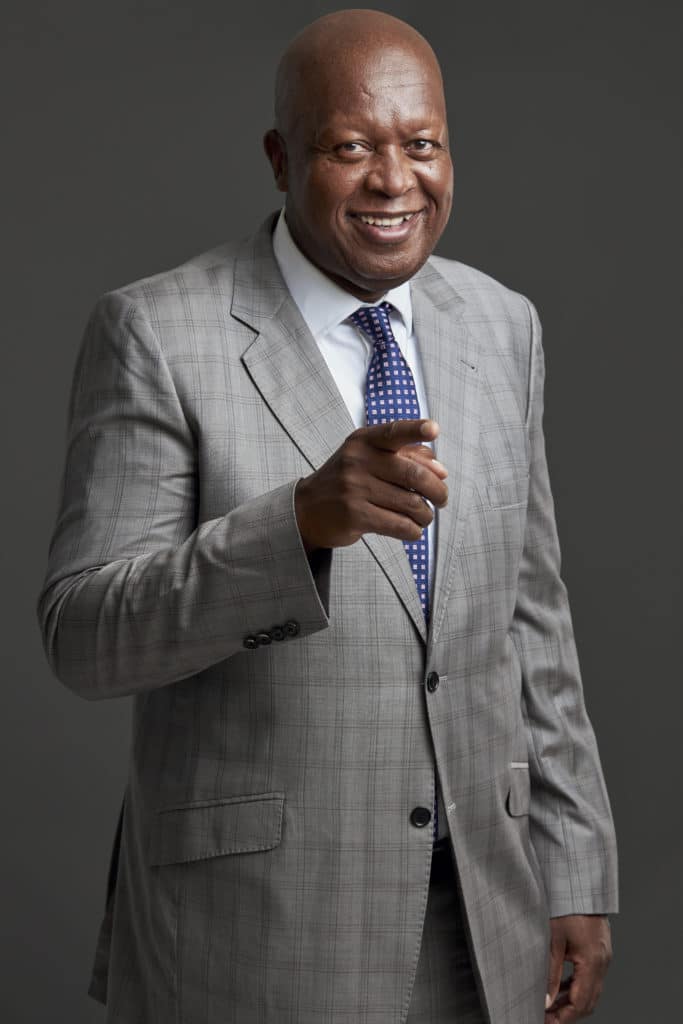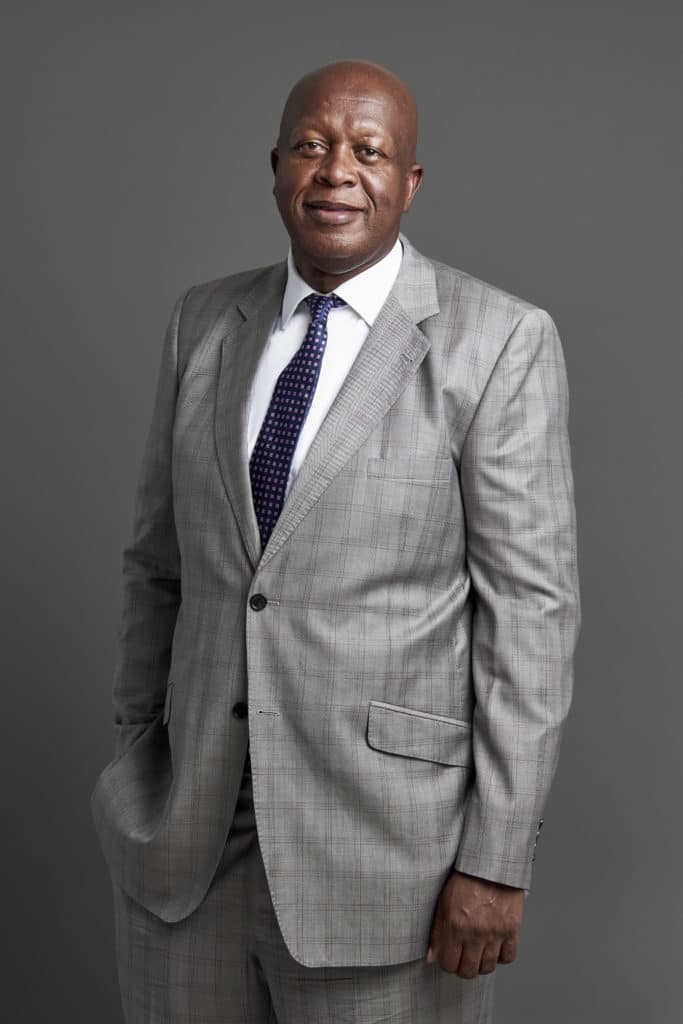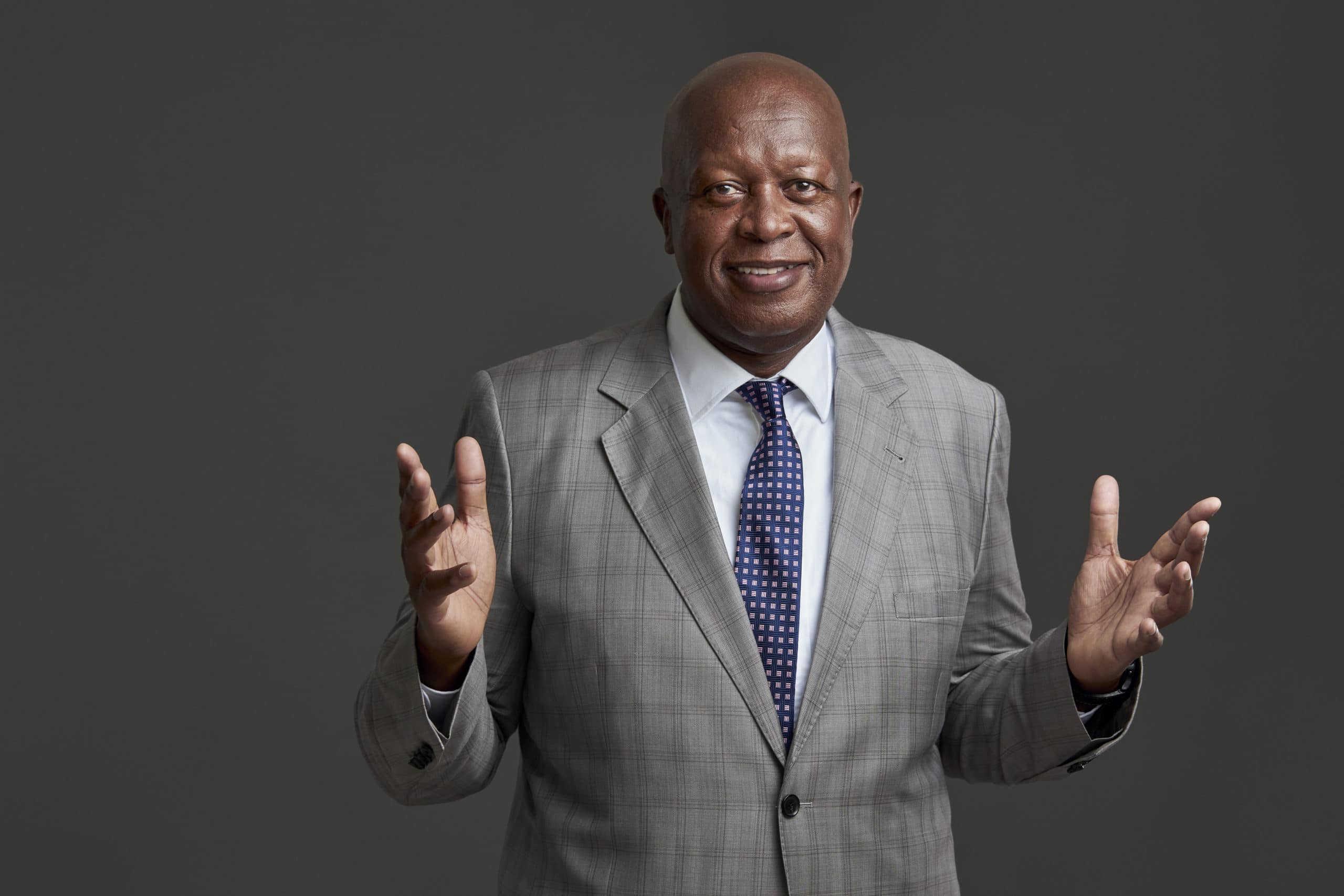From teacher to actuary to entrepreneur, CEO and corporate titan, Sello Moloko has had an illustrious journey that could inspire any young African. Taking over as chairman of the Absa Group from April 1, he is all set to make his mark in defining the future of banking.
By GODFREY MUTIZWA
Photographer: Katlego Mokubyane Studio: Newkatz Studio, Johannesburg
Art Director: Lucy Nkosi
Make-up artist: Okuhle Mciteka
Behind-The-Scenes: Chanel Retief
SOLVING PROBLEMS MAY BE PAR for the course for mathematicians, but incoming Absa Group Chairman Sello Moloko may be about to get his sternest examination yet.
Absa Group remains without a substantive Chief Executive Officer, a year since the unhappy departure of former central banker Daniel Mminele. Mminele lasted 15 months in the group after succeeding Maria Ramos in 2019.
Loading...
Ramos had led the bank for a decade during which it had been a part of Barclays.
“Look, there is a lot of work that needs to be done inside the organization,’’ Moloko says in an interview with FORBES AFRICA on March 8.
“It has to find a new direction and new leadership that would work towards ensuring that we redefine our culture. So at this point we have the excitement to redefine our culture, and operating in 12 countries in the continent, we have to show that leadership from the top.’’
Arguably the first item on Moloko’s in-tray will be the appointment of a new CEO. Mminele, a former deputy governor of the South African Reserve Bank, had joined Absa in January 2020 amid much excitement after Barclays quit as a controlling shareholder. In his departure statement, he spoke of the importance of aligning the CEO and board on strategy and culture.
It is an axis Moloko is well aware of.
Thabo Leeuw, his friend and business partner of more than three decades tells FORBES AFRICA: “[Moloko] is a mathematician. So, solving problems is something that comes
naturally to him… So figuring out ideas, in my short corporate life, I found that it is often an either/or, you don’t quite find in one person a combination of those skills, but it’s certainly something he possesses in abundance. He has an ability to dream, but an ability to also dispassionately and very rationally approach a problematic situation.”
Industry experience has certainly forged the present-day Moloko. He served as Chairman of gold and platinum producer Sibanye-Stillwater for more than six years, working with CEO Neal Froneman as he transformed the company into South Africa’s biggest precious metals producer.
He is also Chairman of Telkom, South Africa’s third largest mobile phone operator, a company that has tenaciously competed against industry behemoths MTN Group and Vodacom Group, and he has previously served as Chairman of General Reinsurance Africa, a company owned by Warren Buffett’s Berkshire Hathaway.
Alignment between the CEO and the board is paramount, he says.

“The new CEO has to work into the culture of the organization and help define a new culture because as you know, this is a business that was taken over by Barclays and had to find a different culture and then obviously Barclays disinvested from South Africa and so it had to find its new direction. So the key thing is to find new leadership and work with that leadership toward ensuring that we redefine the culture of Absa that will return the glory days back to Absa.’’
To be sure, the bank has been rediscovering some its former magic. Acting CEO Jason Quinn in March reported an almost tripling in 2021 earnings on record first-half profit even as the bank recovered from the impact of the coronavirus.
He also reported profitability above pre-pandemic levels, lifted by transactions and customer activity levels also back to 2019 levels.
With more than 30 years in the financial services industry, Sello Matthews Moloko is at home in banking.
A teacher in his teens, the young man from Soweto’s Seana Marena High School says his short teaching stint opened his eyes to the deficiencies of the Bantu education system imposed on the black majority by the apartheid rulers.
“The year I spent teaching was the most gratifying. It presented the opportunity to impact fellow teenagers positively in an education system that was already failing us then. Besides the honorable impact mission, 1983 gave me the break to introspect and to make a critical decision about the direction of my tertiary education.’’
That path was to take him to the University of Cape Town and later to the University of Leicester, United Kingdom, where he completed a Bachelor of Science degree with Honours (Mathematics major) and a post graduate Certificate in Education in 1988 and 1989 respectively.
His corporate journey started in 1989 in the pensions industry doing actuarial work at Alexander Forbes, which resulted in him pursuing actuarial studies. His career took off in earnest when South Africa attained democratic rule in 1994, enabling him to join the asset management industry in 1996 with South African businessman and entrepreneur Mzi Khumalo’s Capital Alliance. With new opportunities opening up, he suspended his actuarial studies.
“In hindsight, that was a good call,’’ he says.
At Capital Alliance, progress was rapid, culminating in his being appointed deputy CEO in 1997. It wasn’t long before he was noticed, and two years later, began the journey at Old Mutual Asset Managers (OMAM), then the largest money manager in the country.
Four years later, he was CEO, and to-date there remains an emotional attachment.
“OMAM provided a great opportunity for growth,’’ he says.
But the entrepreneurial bug was ever present and three days after resigning from OMAM, what had been meant to be an exploration of job prospects turned into a business discussion and so Thesele Group was born with R15 million seed capital from Sanlam Private Equity.
He has never looked back.
“The seed was planted in 1996 whilst in the proximity of the trailblazing Mzi Khumalo at Capital Alliance,’’ he says. “The idea was however dominated by the desire to gain more commercial experience and the itch to ascend the corporate ladder. These roles, whilst time consuming, have been invaluable in my overall professional development.’’
It has certainly worked.
Today, the company co-founded with Leeuw has a portfolio that includes financial services companies MandG Investment Management which manages more than R300 billion ($20 billion), DG Capital, a specialist financial services group, car rental, waste management, property and manufacturing businesses.
Alongside it, is the Thesele Foundation, which targets education, entrepreneurship and skills training.
“I was introduced to Thabo by a friend some 34 years ago and we have maintained a strong relationship since. Through our respective careers, me in investment management and him in corporate finance, we have always shared ideas almost daily,’’ he says.
“We often spoke about forming an entity together. When the opportunity presented itself, and I was unemployed and his firm was a takeover target, we took the plunge. One could say, the stars aligned. What has kept our partnership enduring is deep trust, mutual respect, common purpose and holding each other to account.’’
Beyond his corporate and entrepreneurial journey, Moloko has been true to his desire to give back to the community.
Between 2005 and 2007, he was President of the Association of Black Securities and Investment Professionals (ABSIP), where he spearheaded a program to assist young black professionals enter and grow in the industry, work which continues to-date. He believes the challenge to create employment is a shared responsibility between all social partners.
“The big thing is not about what government can do. I think the challenge that we have is youth unemployment. It’s a universal problem that we have. We need to empower them with skills. We do quite a lot of work with the Thesele Foundation around coding to ensure that we empower them with skills to be able to find their way in life,’’ he says.
“I think it needs to be a united effort. I had an engagement with some business leaders a few weeks ago wherein we said we need to work together as business and solve it together rather than looking for marketing points.’’
It is work he intends to carry into his Absa Chairman’s office, expanding on the work the company is already carrying out. He cites the Thesele Foundation where 4.7% of all dividends declared are channeled in work impacting children and young people.
“It’s one of the things I am going to put on the agenda of Absa to say, how do we also as a financial institution become an enabler, particularly with funding small businesses to ensure that the issue doesn’t become a constraint. And we also do need to solve the issue of education particularly around the areas where I grew up like Soweto.
“So I’m involved in a number of fundraising initiatives that seek to solve the problem. It is important for me being somebody that visits a place where I grew up. I am concerned with what I see and I try in my own small way and encourage other business leaders to join me on the journey to solving some of these problems.’’
It’s continuation of work he and Leeuw have been involved in through their company and foundation. Withinthese firms, Moloko seeks to make a dent on a scourge that faces South Africa and the rest of the African continent: youth unemployment.

But he recognizes today’s youth is different to the youth of his days but he has got some advice.
“Their business proposition is key… so is the strategic depth, attitude, energy and the ability to execute. Attitude is important as it talks to, for example, the individual’s ability to receive feedback and capacity to handle difficulties along the commercial journey.
“My distinct impression is that the younger, modern-day entrepreneurs tend to lack patience. Many youngsters rush into entrepreneurship before they acquire basic commercial skills. Patience is a key attribute in business and helpful in tough periods which materialize from time to time.’’
Moloko joins banking as the traditional financial industry faces
one of its biggest challenges through ever-evolving technological changes. Fintech has barged in like nothing before it, threatening a large chunk of traditional income streams but Moloko thinks banking’s “death” has been greatly exaggerated. It is defining the future and will adjust as required, he says with a smile.
“I’m not necessarily convinced that banks will be obliterated from the face of the earth. I think banks will be reinvented, in essence, and as technology comes, new and better ways of doing things will evolve. The traditional banking model will of course be challenged. However, because of security issues etc, there will be a heightened role that regulators need to play. Banking will not die, it is the form that will change. And I think it will be changed quite significantly.’’
What of crypto and its promise of revolutionizing the financial system as we know it?
“Look, the future of money is not going to be the same. I think with the changes in technology, the way we engage and deal with money is going to be very different. So technology has been a significant disrupter. The future of money is uncertain and we are definitely defining as we go along. And banking isn’t going to be what it is today.
“You know, my son was asking me that the other day, if I have a crypto strategy for myself, or my own investments, and my response was, ‘I’m struggling with understanding the economics of the crypto space’. Maybe I’m old school. But we’ve gotto have an open mind-set, lest we become a Kodak.’’
As well as his strong conviction that banking will survive current changes, Moloko also sees South Africans overcoming their current challenges, put in stark focus recently by a World Bank study showing the country remains the most unequal society in the world, nearly three decades after the dawn of democracy which brought majority black people into the economic mainstream.
“I’m optimistic that our country has the will, has the plans to be able to navigate its challenges. But we’ve got to solve the economy first. Going forward, it will require very decisive, execution-based type of leadership. But simultaneously as we fix this economy, we have got to solve youth unemployment by finding programs that will empower this youth. So we need to be able to give them skills to create jobs and by opening this economy to enable that kind of entrepreneurship to happen. ‘’
Clearly, South Africa will need the skills of the problem-solver to enable its youth to help build an economy that can take its place among the growing economies of the continent but for that dream to be realized, more will need to share it and own it.
With inputs by Lillian Roberts
Loading...
